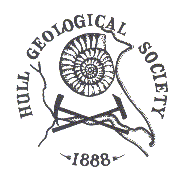

Humberside Geologist no 18
A History of the Hull Geological Society from 1984 to 2025
by Mike Horne FGS
Chapter 2.
Organisation.
The Hull Geological Society was founded in 1888. It became a
registered Educational Charity in 1963. The organisation is in the hands of
Officers and Committee members who are elected annually. There is usually one
main Committee meeting per year in December or January to plan the Annual
General Meeting and Programmes for the year. The Secretary is charged with
enacting the Committee’s wishes. The Treasurer deals with the finances,
receiving the annual subscriptions and preparing the accounts for the Annual
General Meeting. The President or Vice-President chairs the meetings when
available and may formally represent the Society on occasions.
The Committee alone nominates the President for the
forthcoming year and Presidents may serve for up to three years. The Committee
usually nominates people for the other roles but any member can also make
nominations. The Rules specify that there should be a new Committee member each
year. Although the Rules state that there should be five Committee members, some
people are co-opted because we never ask anyone to resign. Representatives of
Hull Museum, Hull University and the Harker Geological Society are or were
invited to Committee meetings. The Committee has the power to co-opt Officers
between AGMs if posts fall vacant; this happened recently following the death of
our Treasurer Rod Towse.
The Committee used to meet in the home of the Secretary or
President, but now the meetings are hosted by the University of Hull. From time
to time during the year further short Committee meetings may be held if the
Officers request further guidance from the Committee. These might be after an
evening lecture, during the lunch break of a field meeting or more recently by
e-mail or video conferencing.
The four main Officers (President, Vice-President, Treasurer
and Secretary) are considered by the Charity Commission to be the Trustees of
the Society. The Secretary acts as the editor-in-chief of the Society’s
peer-reviewed journal, Humberside
Geologist and oversees the editing by a team of volunteers.
Over the years some new named roles have been added to the Committee as
required: these are the Website Editor, Publicity Office, Librarian, RIGS
Officer, Membership Secretary and Archivist. Occasionally there has been an
Assistant Treasurer, who is effectively the Treasurer-elect for a year to learn
the role and enable a smooth transfer of the accounts.
The Rules of the Society were rewritten in 1963 with the help
of a lawyer and approved by the Charity Committee. They set out the objectives
for the Society which cannot be changed. Some of the rules were changed in 2016
to reflect current financial practice. The Society has also introduced some
policies and procedures over the years, either because an incident indicated
that a decision was needed or to reflect good practice established by other
similar organisations. The Society is not a company and has no employees,
however the Committee has adopted good practices that might not be legal
requirements.
We have not experienced any accidents at our events but in
1999 the Society adopted a Safety Policy which has been amended from time to
time. The Society requests that event organisers complete a risk assessment,
especially for field meetings. To make this easier for event leaders a series of
pro-forma risk assessments were produced by Mike Horne and David Hill in 2016 to
cover a variety of standard meetings. A Data Protection Policy was introduced in
1998 following a perceived incident of stalking by a member and to comply with
the law (which might not actually apply to an amateur society). A later
Procedure outlines how the Society stores, shares and uses the personal data of
members. This had to be amended slightly during the COVID pandemic to allow for
the release of personal data to the emergency services.
Other short ad hoc
decisions have been made over the years, which have become policies, or codified
custom and practice. These include our non-approval of the sale of specimens at
our public events for personal gain and stipulating that young geologists may
not be allowed to attend some field trips and should always be accompanied by a
responsible adult (after we lost a teenager on the beach once).
In 2008 the Society was given a large number of books and
journals by the Brynmor Jones Library at the University of Hull. Stuart Jones
became the HGS Librarian and converted a room at his home to become the Library.
These books were not regarded as an asset in the Society’s accounts. Stuart was
paid an honorarium and expenses towards the cost of heating and insurance. Paul
Richards catalogued them, producing a searchable cross referenced catalogue on
CDROM (Richards 2003). The Society received other books from members, Wyke 6th
Form College and some bequests, from John Neale, Ron Harrison and Derek Gobbett
for example. However few members actually borrowed the books. When Stuart became
ill and needed the space again the books were offered to members and various
organisations such as Hull Museums and Hull University. In the end they were
donated to the new Natural History Museum in Sheffield, who collected them in
2024.
copyright Hull Geological Society 2025